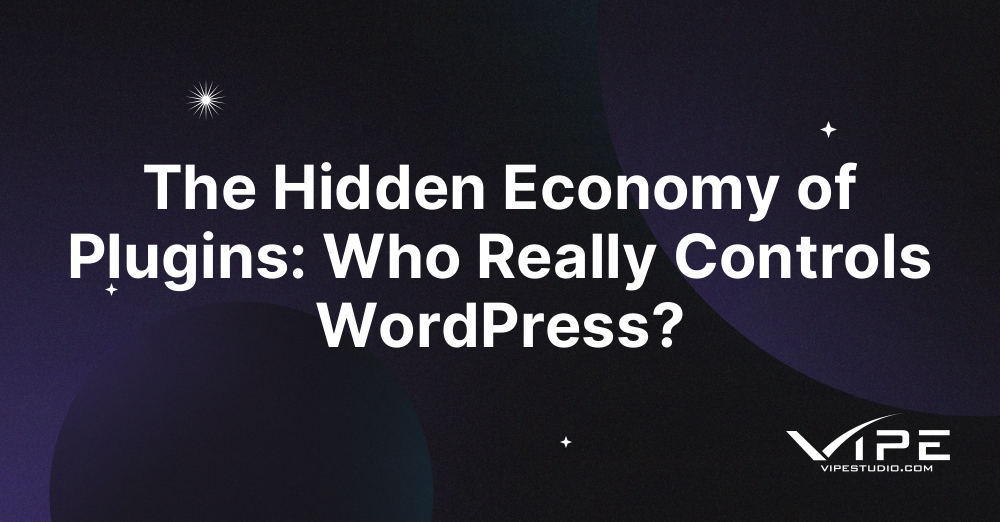05.11.2025
WordPress Development
The Hidden Economy of Plugins: Who Really Controls WordPress?
READING TIME: MIN
Table of Content
Introduction: The Marketplace Behind the Marketplace
On the surface, WordPress looks like a free and open platform powered by community collaboration. But beneath that collaborative spirit lies an intricate commercial network – a hidden economy where developers, marketplaces, hosting companies, and agencies compete for control over functionality, data, and influence. Plugins are the engine of this economy. They extend WordPress far beyond blogging, yet they also shape who profits, who decides the standards, and who holds real power in the ecosystem.
The Plugin Ecosystem as an Economic Engine
Every major feature in WordPress – from SEO to ecommerce – is driven by plugins. The official repository contains over 60,000 free plugins, but the true business takes place far beyond that. Marketplaces like CodeCanyon, SaaS-based plugin providers, and subscription models generate millions annually.
Even small businesses rely on plugins to function at scale. As developers add more integrations and automations, many organizations eventually seek dedicated WordPress development support to build stable and maintainable structures on top of those third-party tools.
Who Owns the WordPress Experience?
WordPress core is community-governed, but plugins create “micro-governments” – companies define UX, rules, and revenue flow for their users. Think of plugins like:
- WooCommerce controls ecommerce
- Elementor controls design presentation
- Yoast + Rank Math fight for SEO dominance
- Jetpack blurs the line between platform and service provider
Users think they are choosing WordPress, but in reality they are choosing the ecosystems built around plugins – ecosystems where monetization is increasingly the driving influence.
Free Plugins Aren’t Really Free
The GPL license enables open distribution, but modern business relies on freemium upgrades, tracking, branding, and upsells. Many plugins use:
- Data collection for behavior-based marketing
- Feature-locking strategies to enforce upgrades
- Persistent admin-area advertising
- Dark patterns that push subscriptions
Developers must generate sustainable revenue – but the result is that “free” often comes with hidden trade-offs in autonomy and privacy.
The Power Brokers of WordPress
Not all plugin developers hold equal influence. A handful of corporations – Automattic, WP Engine (and their brands), Awesome Motive – have acquired large portions of the plugin market. Their portfolios shape what users expect and which standards become the norm.
Acquisitions accelerate innovation – but they also centralize control inside what was meant to be a decentralized ecosystem. Some fear WordPress is slowly drifting toward a commercial hierarchy.
When Plugins Become Dependencies
One plugin can change a site. But dozens can control it. Over-dependency leads to:
- Performance degradation
- Security vulnerabilities
- High renewal costs
- Update lock-in
This creates a critical question: If a business relies entirely on closed-source, subscription-licensed plugins… is it still benefiting from the open-source philosophy WordPress was built on?
Security: The Unspoken Risk
Because plugins access the database and core functions, one poorly maintained extension can compromise an entire infrastructure. Vulnerability databases show that plugin-based exploits remain the most common attack vector for WordPress websites.
Security is not just about firewalls – it becomes a strategic decision about who you trust inside your architecture.
Fragmentation vs. Standardization
Plugins give everyone freedom – but they also create fragmentation:
- Multiple ways to build the same feature
- Conflicting functionality
- Diverging UI patterns
- Compatibility bottlenecks
As WordPress shifts toward block-based architecture (Gutenberg), some major plugins resist, creating competing visions for the platform’s future.
Sustainability and the Future of Plugin Economics
The market is moving toward:
- Subscription-only licensing
- All-in-one experience platforms
- Enterprise-grade support requirements
In advanced projects, organizations often choose to partner with WordPress experts to build custom solutions that remove dependence on fragile plugin stacks.
Who Should Control WordPress?
The WordPress philosophy emphasizes freedom, ownership, and decentralization. Yet the plugin economy brings tension between open ideals and commercial realities. Should community values override corporate interests? Should plugin authors maintain full control over pricing and direction? Or should core impose guardrails to ensure longevity and accessibility?
Conclusion: Choosing Your Stakeholders
Plugins are the beating heart of WordPress – but also the gatekeepers of functionality, performance, and long-term stability. The hidden economy behind them deserves transparency. As the ecosystem matures, we must choose what kind of future we build: one led by open collaboration or controlled by corporate consolidation. Every plugin installed is an economic decision – not just a technical one.
Key Takeaways
- Plugins generate massive economic influence in WordPress.
- Corporate acquisition is shaping the ecosystem’s power structure.
- “Free” plugins often monetize through data and upsells.
- Over-dependency risks performance, security, and ownership.
- Strategic plugin choices determine who controls your digital future.
More on The Topic
- Navigating WooCommerce Performance: Real-World Strategies
- The Role of AI in WordPress Development Workflows
- Optimizing WordPress for Enterprise: Beyond Basic Caching
- WordPress and Headless Commerce: A Provocative Dilemma
- Decoupled WordPress Architecture: The Future or a Fad?
The content of this website is copyrighted and protected by Creative Commons 4.0.



